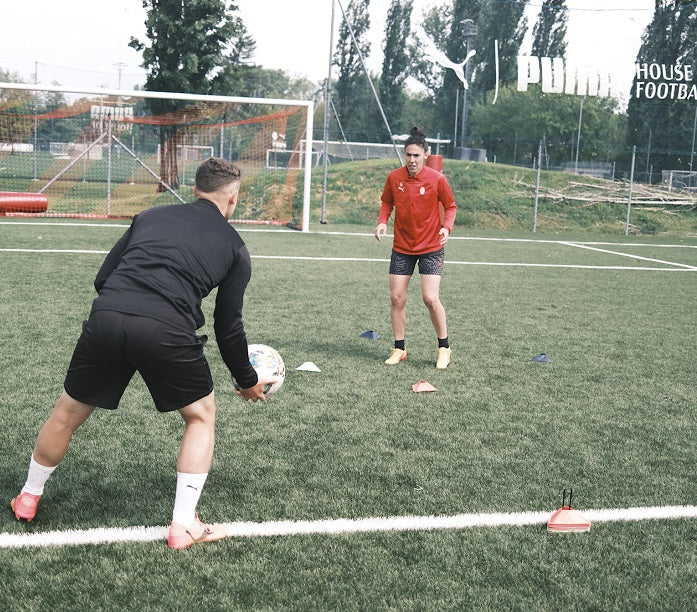Soccer training for 7-year-olds and 8-year-olds is a crucial part of the athletic development of young players. At this age, the main focus is on learning the fundamentals of the game and encouraging the enjoyment of soccer. The following article provides an overview of the most important aspects of soccer training for 7-year-olds and 8-year-olds, including training methods, drills and game formats.

Goals of football training for 7-year-olds and 8-year-olds
Learn the basics
Soccer training for 7-year-olds and 8-year-olds focuses on teaching basic techniques such as dribbling, passing and shooting. At this age, it is important that children develop the basic skills they will need later in their sporting careers.
promoting the joy of playing
A central goal of soccer training for 7- and 8-year-olds is to encourage the joy of playing. Playful elements and varied exercises help ensure that the children participate in training with enthusiasm and have fun playing soccer.
development of motor skills
The training helps to develop children's motor skills. Coordination, balance and mobility are improved through targeted exercises, which is beneficial for general physical development.
Training Methods for 7- and 8-Year-Olds
Playful training
Soccer training for 7- and 8-year-olds should be playful. Exercises and games that are fun and encourage creativity are particularly suitable. Examples of exercises include catching games, small competitions and playful dribbling exercises as well as tournaments.
Technical exercises
Technical exercises are an important part of training. Here are some examples:
- Dribbling around cones: Children dribble around cones to improve their ball control.
- Ball handling: The children do various exercises directly on the ball
- Passing and receiving: In pairs, the children practice passing and receiving the ball to improve their passing accuracy.
game forms
Game forms are small games that apply what has been learned and promote teamwork. Examples are:
- 3-on-3 games: Small games with three players per team promote teamwork and overview.
- Mini-games: Games on small fields with reduced rules help children develop their understanding of the game.
Training content for 7-year-olds and 8-year-olds
warm-up
Warming up is an important part of every training session. Light running exercises and simple ball exercises prepare the children for training and reduce the risk of injury.
Technical Training
The technical training for 7-year-olds and 8-year-olds includes exercises on the basic techniques of football:
- Dribbling: exercises for ball handling and control.
- Passing: Exercises to improve passing accuracy and strength.
- Shooting: Exercises to improve shooting precision and power.
coordination and mobility
Coordination and mobility exercises are important for the development of motor skills. Examples include:
- Running exercises: Exercises to improve running technique and speed (e.g. with the coordination ladder).
- Balance exercises: Exercises that promote balance and stability.
game forms and matches
Game forms and small matches are a central part of the training. They offer the opportunity to apply what has been learned in a game situation and to improve the understanding of the game.
Tips for Trainers
patience and motivation
Coaches should be patient and always motivate the children. Praise and positive reinforcement are crucial to building the confidence of young players.
variety and fun
The training should be varied to motivate the children. Playful elements and creative exercises ensure that the training remains exciting.
Individual support
Every child has different abilities and levels of development. Coaches should make sure to respond to the individual needs and strengths of the children and promote them in a targeted manner.
Conclusion
Football training for 7- and 8-year-olds lays the foundation for further athletic development. Through playful and technical exercises that promote enjoyment of the game, young players can learn the necessary basics. Patience, motivation and a varied training program are crucial.
Individual football training for children
At 360Football we offer individual soccer personal training for children , which is specifically tailored to the needs and goals of young players. Personal training can be useful if a child needs special support to improve certain techniques or if they want additional support outside of regular club training. However, it is important that the training is age-appropriate and that the focus is on enjoying the game. Find out more about what we offer on our website: 360Football personal training.


